Dream of working in the beauty industry? Sounds like you’re destined to become a makeup artist! But what does a day in the life of a makeup artist actually look like?
We’re here to tell you!
All you need to do is sit back and relax. By the end of this article, you’ll have a pretty clear idea of what the day-to-day responsibilities of your dream career will look like. As a result, you can decide once and for all if this profession is truly the right one for YOU!
How Do You Train to Be a Makeup Artist?
First thing’s first: we have to talk about proper makeup training. After all, you can’t successfully start life as a makeup artist if you don’t properly know what you’re doing!
Now, the thing is, professional makeup is an unregulated industry – unless you aim to be a cosmetologist. This means that technically, you don’t need a certification or official designation in order to call yourself an MUA and work with clients.
But don’t get it twisted! If you don’t have a legitimate education under your belt, it’s going to be very hard to become successful. Here are just some of the biggest reasons why:
- The right certification – such as those provided to graduates of QC Makeup Academy – will be internationally-recognized. Meaning, you’ll be able to work anywhere!
- Proper training is the only true way to get the knowledge and subject-matter expertise needed to perform to the best of your abilities. Once you’ve graduated from your program, you can then elevate your skill-set through hands-on, real-world experience.
- You’ll have a stronger grasp on the ways you can distinguish yourself from your local competition, which will better your booking ability and land you more clients.
- Moreover, you’ll acquire an understanding of how to build your brand, hone your niche, set accurate service rates, and launch a functional business.
- Clients won’t want to hire a makeup artist who isn’t certified (and therefore, credible). At the end of the day, it’s that simple!
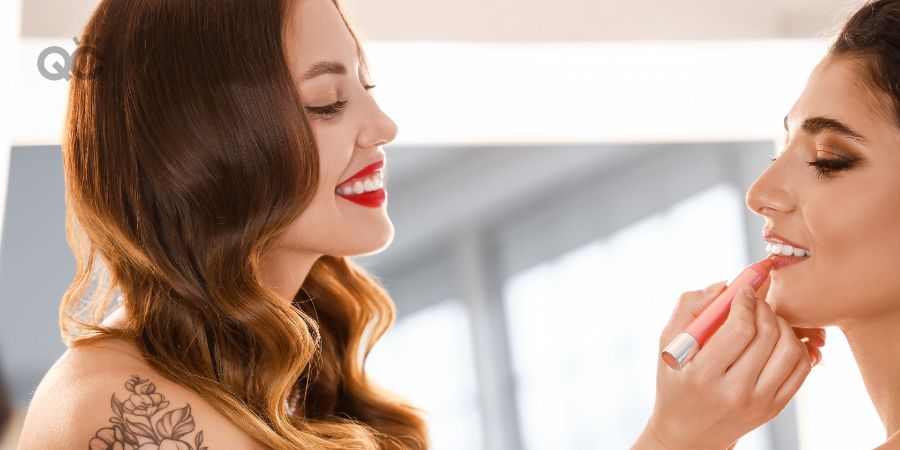
Picking The Right Makeup Course for YOU
Nowadays, you have COUNTLESS options at your disposal, both online and in-person. That said, in light of the ongoing pandemic, many have steered away from brick-and-mortar schools due to the potential health concerns they pose. One of the biggest lessons learned over the past 2 years is that distance learning offers more than a few perks for those wanting to pursue their education in a safe, convenient environment.
Because online schooling is the new normal these days, that’s what we’ll focus on in this article. However, if you’re someone who prefers learning in a physical environment, surrounded by your peers and instructor, that’s okay, too. In that case, we recommend that you do as much research as possible into the brick-and-mortar options available in your area.
Perks of an Online Makeup Course
In general, online schools cater to a wider range of people than in-person schools. For example, you’re granted the flexibility to access the same high-quality education – except you get to be in the comfort of your own home. Furthermore, distance learning is almost always cheaper than brick-and-mortar schools, since there are no physical campuses or buildings to maintain.
Another benefit is that many online schools offer self-paced training. QC Makeup Academy, for instance, gives you 2 full years to complete your makeup artistry program, starting on the date you enroll. That said, during that 2-year timeframe, you can dedicate as much or as little time to your studies as you’d like.
Let me put this into perspective… Many of QC’s graduates have been able to earn their certification and start their life as a makeup artist in as little as 2-6 months – simply be devoting a mere 1-2 hour per week to their studies!
Want to learn more about QC Makeup Academy’s self-paced, online courses? Here’s the full list!
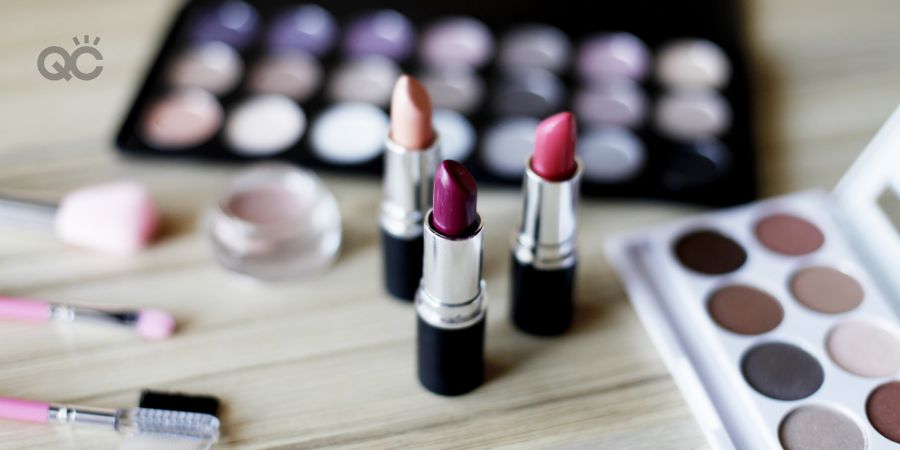
How Many Hours Does a Makeup Artist Work Each Day?
What makeup artists do on a daily basis can vary, based on a number of different factors. For this reason, there’s no “clear cut” standard number of hours you’ll work every single day. One day, you could be swamped from morning to night; another day, you could be super busy just for an afternoon.
The Type of Job Will Affect Your Hours
The job you’ve booked, as well as how many clients you have on the go at a given time, will influence the number of hours that’ll have to go into the work. For instance, if you’ve been hired on as an MUA for a wedding, doing just the bride’s application will take a lot less time than if you were also expected to do the bridal party’s makeup, too.
Moreover, logically, the more clients you book in a day, the longer your workday will be. If you have one booking for just one person, you’ll probably be looking at anywhere from 2-4 hours that day (factoring in travel time, and based on how complex the application is). But if you have several customers booked throughout a single day, you’ll likely be starting early and finishing late.
Other Examples
Working on set can also make for a lengthy day, especially if it’s for a TV show or film production. This is because, in addition to the initial application itself, you’ll likely be expected to remain on set throughout the shoot. That way, you can jump in whenever touch-ups are required.
Now, let’s say that you dream of being an MUA, but would prefer a more predictable, routine schedule. In that case, your best bet will be to join an existing team (e.g. at MAC, Sephora, etc.) and/or work at a beauty bar/counter. In this type of environment, your schedule will be decided by your employer, and you’ll get it in advance.
As such, you’ll know exactly what days you’ll be working, and for how long you’ll be working each day. This can make it much easier for you to plan everything else in your life around your work hours. Of course, for those who wish to have a more proactive role in their makeup career, this route won’t always be ideal. But if this would fit best with your goals and interests, then all the power to you!
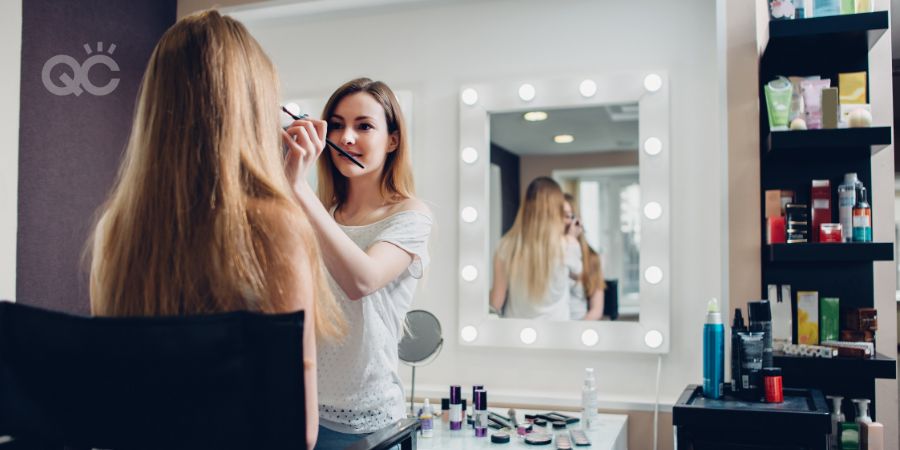
What Specific Skills Does a Makeup Artist Need?
Obviously, to thrive as a professional makeup artist, you need to have a grasp of proper makeup techniques. Moreover, you need to know how to execute them successfully during an application, in order to deliver the high-quality results your client is expecting.
More to the point: it’s also critical that you have a genuine passion for your craft. Otherwise, this career won’t be the one for you. And, let’s be real, you probably wouldn’t enjoy it at all.
On top of this, though, you’ll also need to possess a handful of other key traits as well. For example, you’ll need to be:
- A people person (at least, to some degree);
- Good at both communicating and listening;
- Creative;
- Up-to-date on makeup and beauty current trends;
- Business-savvy;
- Capable of keeping calm under pressure, while on strict time restraints, etc.;
- Smart with money and budgeting;
- Knowledgeable in many different makeup techniques, so you can apply them to many different makeup styles;
- Approachable and friendly;
- Flexible;
- Willing to put the effort into networking;
- A wizard with emailing, returning phone calls, replying to people on social media, etc.;
- And so much more!
What Does a Makeup Artist Do On a Daily Basis?
Okay, let’s get to the real reason why you found this article in the first place – you want to know what a day in the life of a makeup artist looks like. Here’s the bad news: much like when we were discussing how many hours you’ll work in a day, there’s no “one-size-fits-all” answer to this question. What makeup artists do on a daily basis is determined by:
- The client they’re working for/with;
- The parameters of the job;
- Whether the MUA in question works for an established company or runs their own business;
- And more!
But here’s the GOOD news: I can break down enough information so that you can still walk away with a thorough understanding of what to expect out of this career path. So, let’s delve into that…
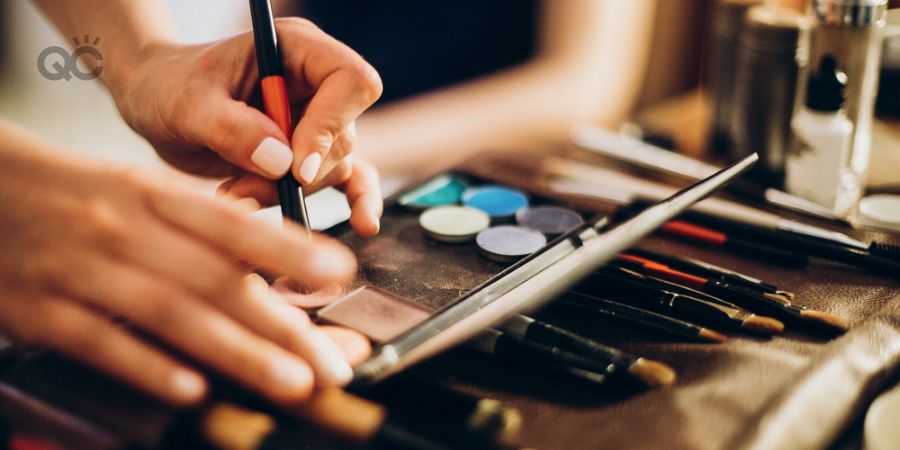
What Every Job Has in Common
Regardless of the type of MUA you are, the client you’ve booked, or the length of your day, every makeup job will require you to:
- Work with people (whether that’s a single person, multiple, or a whole group).
- Listen to what the client wants, and determine how best to achieve those results in a time-efficient manner.
- Draw on your professional makeup certification training.
- Use sanitized, single-use products.
- Work in a clean environment, and properly clean your work station after each makeup job.
- Apply your expert knowledge during the application(s).
- Deliver top-notch customer service.
- Make the best possible impression for you – and either the business you’re representing, or your personal business itself.
Working for an Existing Makeup Business
Let’s say you wish to land a cosmetic retail job of some sort. This could be in the form of working at a beauty bar, or in a makeup store such as MAC, Sephora, etc. A typical day would first involve you showing up to work at the designated time your employer has set for you. From there, your job will be to man the counter or walk the floor.
You’ll greet everyone who enters the business, and see if you can help answer any questions they may have or assist with their purchasing needs. It won’t be uncommon to have walk-in customers ask for your help testing out a product, do a basic consultation and/or application with them, etc. You’ll also have just as many customers book an application appointment ahead of time, too. So, that can also sometimes be a part of your workday.
One perk of working for an existing company is that 9 times out of 10, your job responsibilities will start and end within each individual shift. There won’t be work you’ll need to do outside of your scheduled shifts, such as social media focus, client acquisition/retention, or marketing efforts. Rather, these companies will already have experts taking care of this.
Thus, once you clock out at the end of your shift, you’re completely done for the day!
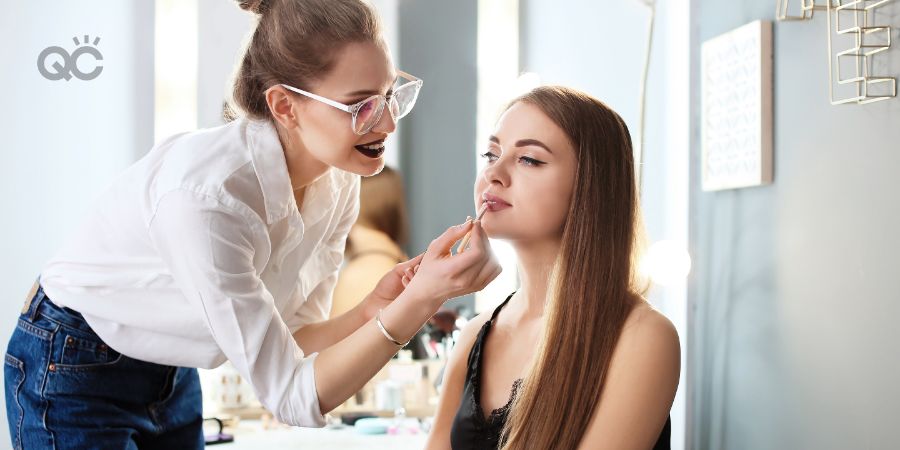
Running Your OWN Makeup Business
Running your very own makeup business will admittedly result in longer days and a lot more job responsibilities. This makes complete sense, since you’ll be responsible for your business’s success! That said, this is the ideal path for many aspiring MUAs, because they find it to be the most rewarding.
There’s a lot more that goes into running a makeup business than simply doing makeup for/on a client. In reality, other tasks you’ll regularly have to complete on a given day can include (but aren’t limited to):
- Developing and putting into practice client acquisition and retention efforts/strategies;
- Scheduling and conducting client consultations;
- Conducting follow-up appointments, if requested/required;
- Developing air-tight client contracts;
- Answering emails, returning phone calls, etc.;
- Doing trial runs, such as for bridal makeup, film makeup, etc.;
- Running active social media accounts for your business;
- Maintaining your business website and overall SEO;
- Marketing your business using a variety of methods (i.e. paid ads, social media advertising, email campaigns, etc.);
- Collecting payment by the agreed-upon due date;
- Providing invoices once payment have been received;
- And more!
There can easily be additional responsibilities, depending on the scope of your career goals. If, for instance, part of your business plan is to develop your own line of products, then you’ll also need to factor in the necessary research and legwork that goes into this endeavor as part of your day-to-day responsibilities.
Another key aspect to consider is where you’re conducting your business from. Say you’re primarily working from home and clients are coming to you. For every application, you’ll also need to factor in time to set up your work station before the job, as well as time to sanitize/clean it after the job is over.
If you travel directly to clients, or own your own business location or salon, you’ll need to factor the time it’ll take to travel to and from work each day. Moreover, if you fall into the latter category, your daily tasks may sometimes involve the overhead work and maintenance that goes into owning or renting a commercial space.
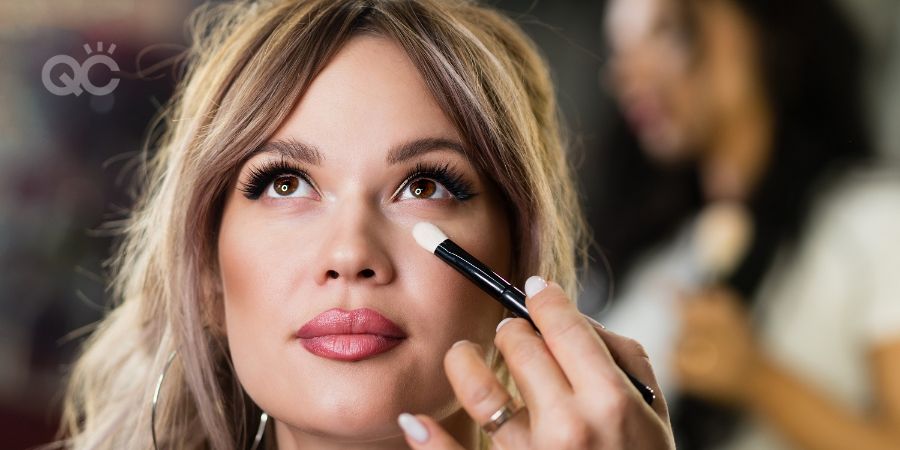
What makeup artists do on a daily basis is a subjective topic. Ultimately, it’ll depend on YOU – your work ethic, your diligence, your drive, and your career goals. The harder you work, and the more effort you put into your craft, the busier your day will be… and the more successful your journey will become!
So, now that you have an idea of what a day in the life of a makeup artist can look like, do you still wish to pursue this career path?
